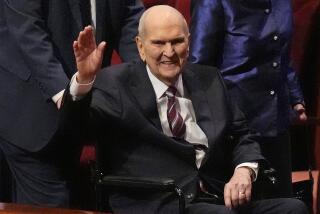Mormon Leader Takes Stock of Church’s Progress
- Share via
Gordon B. Hinckley, the 15th president and prophet of the Church of Jesus Christ of Latter-day Saints, served notice Thursday night that the church has come of age and is prospering in a nation it helped pioneer.
Speaking to a Los Angeles World Affairs Council audience, the leader of the 9.7-million-member worldwide church traced its 167-year history and its impact on the settlement of the West.
Reveling in the church’s growth and its movement in the American consciousness from persecuted minority to mainstream acceptance, Hinckley, 86, said he stood in “reverent respect” of the contributions of those who came before him.
“We are trying to keep faith with those of the past,” he said before an audience of 2,290. “From them has grown something wondrous and great.”
Hinckley noted that the church has members in 160 countries and that last year, for the first time, there were more Mormons outside the United States than within it.
It was his first public address to a general audience in Southern California since he became president two years ago. Believed by the faithful to be God’s living prophet on Earth, Hinckley succeeded the late Howard W. Hunter.
Earlier Thursday, Hinckley met with executives of the Times Mirror Corp. and editors and reporters of The Times.
He disclosed that the church will enter the controversy in Hawaii over efforts to recognize same-sex marriages, which the church opposes.
That state’s Supreme Court ruled in 1993 that denying marriage licenses to same-sex couples was unconstitutional without a compelling public interest.
Since then, the state Legislature has become embroiled in competing measures, including a constitutional amendment to ban same-sex unions.
“We’re engaged right now in the same-sex marriage problem in legislation in Hawaii,” Hinckley said. “We just made a decision today concerning the filing of a brief in that case. That’s spreading across the country now pretty largely and we’ve become rather actively involved in that kind of thing,” he said.
Hinckley also said that the church may speak out on an international furor that erupted after an English scientist in Scotland became the first to clone a mammal, a white-faced sheep named Dolly.
Other religious leaders and ethicist have raised alarms over the consequences should human cloning ever take place. Earlier this week, President Clinton banned federal funding for research into human cloning.
Hinckley said the issue is still new. But he said that if concern grows, “I’m confident we’ll speak out on it.” Until now, however, he said the church has not given the issue much consideration. Still, he said in response to a question, the idea that someday a human may be cloned using a cell from just one parent could pose theological problems.
“It’s in the field of speculation still, but it could become a matter of serious concern,” he added.
During a question-and-answser session, Hinckley was asked about whether women would ever be admitted to the all-male Mormon priesthood. After recounting the importance of women in church ministry, Hinckley asked rhetorically, “Do they hold the priesthood? No. Do they want it? No. I think they’re satisfied and happy and doing a great and marvelous work.”
Hinckley, in response to another question, said that despite the church’s worldwide reach, it is not present in China. “We go where we’re invited to go. We always go in the front door and China does not permit that.”
He added that he hopes that when China assumes control of Hong Kong, the church’s temple there and its religious practice will be respected.
Commenting on the rapid growth of the church at a time when other religious bodies are either losing membership or static, Hinckley said the 4% annual growth rate of the Latter-day Saints was because his church is “rather demanding.”
“We expect great things of our people, the little things, the big things. We expect a measure of sacrifice. If it’s worth belonging to the church it’s worth sacrificing for it, and people do sacrifice,” he told The Times.
Secondly, he said, rapid change in society and “terrible social ills” are prompting people to join.
“People are looking for stability in a shaky world. They want something they can get hold of that’s firm and sure and an anchor in the midst of all of this instability in which they’re living,” he said. “I think we offer that. And I think we see the result of that which we offer.”
More to Read
Sign up for Essential California
The most important California stories and recommendations in your inbox every morning.
You may occasionally receive promotional content from the Los Angeles Times.













